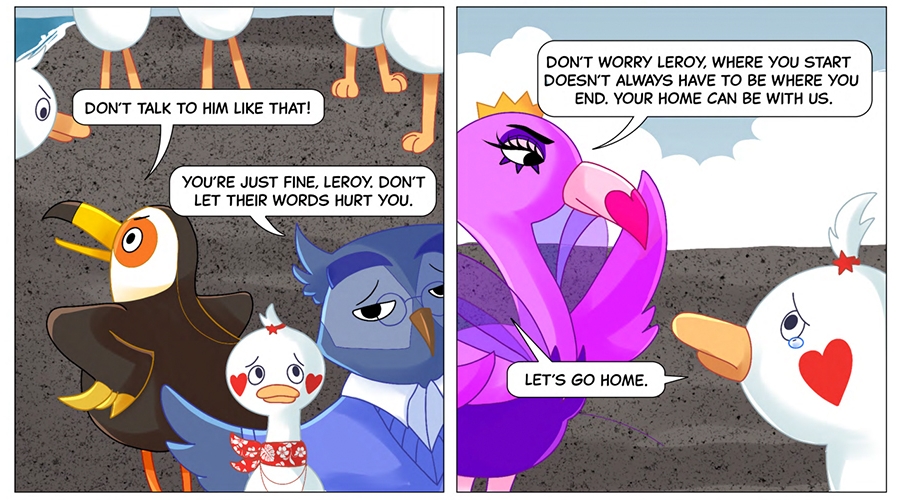
Candace Lavin left big shoes to fill. The well-loved Otis College instructor—who taught in the Digital Media, Liberal Arts and Sciences, and Creative Action programs—died in December 2019, just as the fall semester was ending. One of Lavin’s greatest legacies in her 13 years of teaching at the College was her Comic Heroes class—considered one of the most popular in the Creative Action program—which aimed to elevate unheard stories through the medium of comic books and superheroes. In 2018, Lavin partnered the class with the It Gets Better Project, a nonprofit organization that supports and celebrates lesbian, gay, bisexual, transgender, and queer (LGBTQ+) youth around the globe. Students in the Comic Heroes course created stories about coming out, and characters who fought against discrimination or identifed in ways that differed from the norm in the worlds they portrayed.
The course is now taught by Lynly Forrest, Lisa K. Weber, and Kelly Sue Milano, the trio behind HexComix, a Los Angeles-based, independent comic book label that aims to showcase non-traditional voices; they also are the creators behind the titles HEX11 and Dragon Kitties. The three had been mentors to Lavin’s class and stepped in after Lavin’s passing to help resume the class in Spring 2020.
“The class’s main purpose is to educate young artists about comic book creation and the world of comic books and the impact that the story format can have on the world around us,” says Forrest. “It wasn’t until I started making a comic with Kelly Sue and Lisa and started meeting other creators that I really came to understand the power that comics have, and how essential they really are as a tool for telling great stories, and for people being able to relate to those stories in emotional and profound ways.”
This fall semester, the class met with and interviewed It Gets Better youth ambassadors, who are inspiring the stories in their comics. “There has been an emphasis on telling stories that didn’t make a person’s gender or sexual identity the point, because it’s like showing them as something different or separate. Why can’t this person be trans and just be living their life?” says Forrest. “This way the people who are consuming this content can just see themselves as normal instead of as a special thing or an outside thing or a separate thing. [With our students] you don’t have to be of the same identity [of the character] to know what it feels like to be on the outside or to be bullied, to not feel accepted or to feel that you don’t have a voice. You don’t have to go very far to look at these stories and say, ‘I can see myself in them.’”
Forrest credits Lavin with making Comic Heroes a safe space for students struggling with their own identities. “The students were drawn to her because she was so outspoken and super supportive of all of them,” she says. “Candace was an example of ‘it getting better.’”
In order to teach students about comic book creation and impact, Forrest and her cohorts lean on their respective strengths. The first few weeks are focused on story craft and characters, which Milano, as the writer at HexComix, handles. Weber, the illustrator, delves into the visual aspects of creating a comic book, and Forrest, as HexComix’s producer, takes on the day-to-day duties.
“But not a day goes by that I don’t think of Candace,” says Forrest. “Whenever Lisa and Kelly Sue and I are talking about class, I still feel like we’re teaching Candace’s class. We’ve all had our own struggles. They’re different struggles, but they’re struggles nonetheless. It doesn’t keep us from being able to say, ‘Hey, this is the place where you can discover what matters to you. This is the place where you can express how upset you are or how angry you are. And also, make the outcome anything you want it to be. It’s art. You get to control the world, you get to control the people in it. You get to control all of it and it’s really therapeutic.’ Knowing our partnership with It Gets Better was so important to her because of the stories we are telling, and because a lot of students come to the class looking for that same kind of support that she was able to give, I think we are still doing Candace’s work. Candace was the safe place and she helped students see that they can be whoever they want to be.”
To see work that students in Comic Heroes have been creating in partnership with It Gets Better, please visit this link.
Main image: A scene from Leroy n' the Rainbow Squad by Otis College Comic Heroes students Noel Ayard, Tony Hong, Yessica Kim, and Ellen Li.


